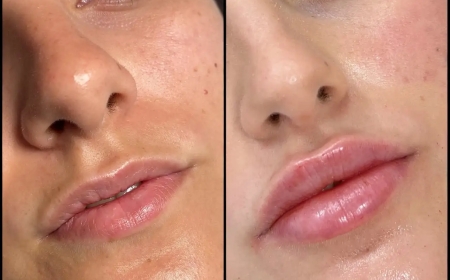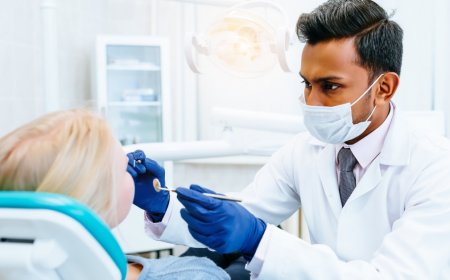Protect Your Smile with Immediate Dental Attention
Acting fast during a dental emergency can save your teeth, stop infection, and reduce future treatment costs. Ballymena dentists are here to help

A dental emergency can happen unexpectedly from a knocked-out tooth during sports to a sharp ache waking you in the night. While pain may prompt you to act, the real urgency lies in preventing long-term complications like infection or tooth loss. Quick, informed action can be the difference between a simple fix and a costly, complex procedure. Putting off treatment raises the chance of lasting harm and impacts general wellbeing.
Knowing what qualifies as an emergency and responding promptly ensures you receive timely, effective treatment. Protect your smile by being prepared when dental trouble strikes because every moment truly matters.
Understanding What a Dental Emergency Is
A dental emergency involves any oral issue that requires urgent attention to stop pain, prevent further damage, or control infection. While not every oral concern needs same-day treatment, certain signs should never be ignored.
Common dental emergencies include:
- Severe or persistent toothache
- Knocked-out or loose teeth
- Cracked or broken teeth causing pain
- Bleeding from the mouth that wont stop
- Swelling in the gums or face
- Lost crowns, fillings, or dental appliances causing discomfort
Its important to recognise these symptoms early and book an urgent appointment with a qualified professional such as a dentist in Ballymena, who can assess the severity and act promptly.
Why Timely Treatment Makes All the Difference
Postponing dental care during an emergency might seem manageable at first, especially if painkillers offer temporary relief. However, such delays can lead to serious outcomes, including irreversible damage and higher treatment costs.
Consequences of delaying emergency dental attention:
- Tooth loss:A dislodged or infected tooth that could be saved may need extraction.
- Infection Risk:Untreated oral infections may enter the bloodstream and impact major organs.
- Increased discomfort:A dull ache can turn into a severe, throbbing pain.
- Jawbone Loss:Unaddressed infections may lead to deterioration or loss of jawbone tissue.
- Complex treatment:Minor issues may escalate, requiring surgery or tooth replacement.
Consulting anemergency dentist in Ballymenaensures that even a seemingly minor problem is handled before it becomes more serious.
What To Do in a Dental Emergency
Timely and proper action during a dental issue can significantly influence recovery success. The table below outlines practical first-aid steps for common scenarios:
|
Type of Emergency |
Immediate Steps to Take |
|
Knocked-out tooth |
Pick up the tooth by the upper part, clean it softly, store it in milk or a saline rinse, and seek urgent dental care |
|
Cracked tooth |
Swish your mouth with warm water and use a cold compress to minimise swelling. |
|
Severe toothache |
Rinse with saltwater, use over-the-counter pain relief, and avoid chewing on that side. |
|
Abscess or swelling |
Apply a cold compress outside, rinse with warm saltwater, and schedule an urgent dental appointment promptly. |
|
Bleeding gums or mouth |
Apply pressure using clean gauze, remain upright, and seek help if bleeding doesnt stop. |
Taking action swiftly can reduce pain, protect the tooth, and avoid complications.
The Role of Emergency Dentists
An emergency dentist in Ballymena plays a vital role in managing urgent oral care needs. With access to specialised tools and experience, they can handle a wide range of critical situations effectively and compassionately.
Services typically offered by emergency dentists include:
- Pain relief and anti-inflammatory treatments
- Emergency tooth extractions
- Temporary and permanent fillings
- Root canal treatments to preserve infected teeth
- Treatment for facial swelling and abscesses
- Replacing lost dental crowns or bridges
By seeking a trusted emergency dental provider, you can expect rapid relief and personalised care that focuses on saving your natural teeth and reducing stress.
Preventing Dental Emergencies
While not every emergency can be avoided, many can be minimised through smart habits and regular dental visits.
Prevention tips:
- Attend routine check-ups and cleanings
- Avoid biting hard objects like ice or pens
- Wear a mouthguard during sports
- Address small dental issues before they escalate
- Dont ignore gum sensitivity or bleeding
- Refrain from using teeth to open packaging or bottles
Proactive care with yourdentist in Ballymenacan help detect early signs of decay, gum disease, or bite problems before they turn into urgent concerns.

Emotional and Physical Toll of Dental Emergencies
Pain and discomfort aside, dental emergencies can significantly affect your mental well-being. From difficulty eating to feeling self-conscious about your smile, these events take more than just a physical toll.
The impact includes:
- Disrupted sleep due to pain
- Difficulty focusing at work or school
- Avoidance of social events due to appearance
- Increased anxiety, especially if the problem worsens
- Long-term effects on diet and nutrition
Prompt treatment restores comfort and confidence, two factors essential to your overall wellness.
What Should Be in Your Dental Emergency Kit?
Being prepared for a dental emergency isnt just for those with ongoing issues. Every household should consider keeping a small kit ready.
Essentials to include:
- Sterile gauze
- Saline solution or salt sachets
- Small container with lid (for knocked-out teeth)
- Over the counter pain medication
- Dental wax (for damaged braces or sharp edges)
- Emergency contact information for your dental provider
Having these items on hand allows you to act quickly, especially if you're travelling or cant reach a dental clinic right away.
When to Seek Immediate Help
Its not always easy to judge the severity of a dental issue, but certain warning signs should never be ignored.
Seek emergency care if you experience:
- Swelling around the jaw, neck, or mouth
- Persistent bleeding despite applied pressure
- Sudden sharp pain in teeth or gums
- Visible trauma to a tooth or facial bone
- Signs of infection such as pus or fever
In these cases, delaying treatment can pose a risk not just to your oral health but your life.
Conclusion
Good oral care is a foundation for long-term health beyond just dental benefits. Dental emergencies demand fast, skilled care to prevent permanent damage and reduce discomfort. Whether it's a knocked-out tooth, painful swelling, or sudden trauma, knowing how to act and where to go can make all the difference.
If you're in need of urgent dental support, turning to trusted professionals in Ballymena ensures your oral care is handled with expertise and compassion. Don't wait for pain to get worse, secure your smiles future with prompt, professional care.


































